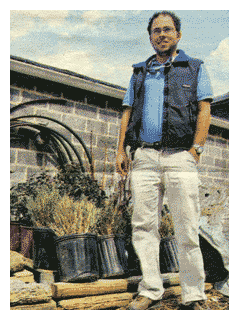BY CAM GERVIN
COMMUNITY NEWS WRITER
When Michael Phillips was a student at the University of Tennessee, one of his landscape design professors encouraged the restoration of native plants
into yards. Mr. Phillips was already an outdoor enthusiast and had never been a fan of what he terms the "cookie cutter look." He took his professor's idea Mr. Phillips was already an outdoor enthusiast and had never been a fan of what he terms the "cookie cutter look." He took his professor's idea
and ran with it, opening Fiddleheads Native Landscaping with his wife Natalie in 2001.
The North Chattanooga business has grown from just the two of them to 10 employees. Mr. and Mrs.
Phillips provide everything from lawn makeovers to weekly weeding, all utilizing plants native to the
Southeast.
"I feel it's important to incorporate native plants back into design," Mr. Phillips said. While the "natural"
look is certainly a growing trend in landscaping, Mr. Phillips said planting native is also good for the
environment. He explained that using plants that grow naturally in this region supports wildlife and
sustains the whole ecosystem. Planting a yard with greenery native to Chattanooga also can make life
easier on the homeowner. If a plant grows out in the
wild anyway, it is accustomed to the South's heat, average rainfall and insects. Thus, little watering, pesticides or fertilizers are needed.
Mr. Phillips said that his low-maintenance, drought-resistant lawns are not what one might expect. He and his wife can create the lush, overgrown
"natural" look, or they can create a formal suburban lawn that blends in with the rest of its neighbors.
Fiddleheads has also landscaped new construction, corporate offices and civic parks. Mr. Phillips said although more people have become aware of the
perks of native landscaping, most people still don't realize that their yards are probably full of exotic, invasive plants. He said that if someone is extremely
attached to his privet hedges, he would not necessarily remove them. "I strongly discourage (keeping them)," Mr. Phillips said. "Birds and other animals
will relocate exotic plants into the woods, and they just take over."
Besides the ubiquitous plants are honeysuckle, English ivy and bamboo. For homeowners who love the bamboo look, which Mr. Phillips admits he likes
as well, there are native types of bamboo, like river cane, that won't strangle other plants — or pop up in neighbors' yards, which bamboo has a nasty
habit of doing. But if you chop down your privet and honeysuckle, what should you use to replace them? Mr. Phillips recommended azaleas, wild
hydrangeas and red twig dogwoods. Tulip poplars and red maples make nice arboreal additions.
Mr. Phillips gives free design estimates on yards -located inside Chattanooga. A consultation for the do-it-yourself gardener starts at $100 per hour, while
maintenance contracts can run anywhere from $150 to $700 a month, depending on the amount of work involved. |